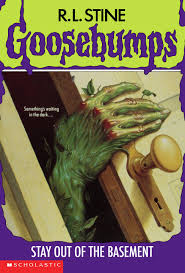Each book had an amazing cover; relateable, yet thin, characters; and most had a twist ending or no real ending at all, which are the best kind of endings in my opinion.




Each book had a unique cover illustrated by Tim Jacobus.
I remember the first time I saw Welcome to Dead House, the first Goosebumps book, in the Scholastic book order the fall of 1992. I just had to get it. My mom, I think, was beyond ecstatic that I found something I liked to read. While always a good reader, I was, admittedly, a bit reluctant. I read short books on the presidents, on animals, but nothing else unless I had to. I didn't realize, not until this cover grabbed me, that, for me, scary stories was where it was at. I bought the book, devoured it until it literally fell apart, then bought a new copy so I could devour that one as well.
And they all included the famous tag line on the bag--"Reader Beware, you're in for a scare. Coming soon [or "also available," depending on whether or not you have a first edition] from R.L. Stine: [the next book]." Then a preview of the next one was included, like a sneak peak.
Although Goosebumps is remembered today as a monthly book series, it wasn't monthly until the following spring, 1993, with the release of the seventh book in the series, Night of the Living Dummy. The first two books, Welcome to Dead House and Stay Out of the Basement, were released simultaneously in July of 1992, with Monster Blood following in September, Say Cheese and Die! in November, The Curse of the Mummy's Tomb in January, and Let's Get Invisible! in March.
In my experience, I assumed Goosebumps was going to be a four-book series, as I had Monster Blood, book three, which advertised the upcoming Say Cheese and Die! For some reason, I had a bit of a delay in picking up Say Cheese and Die!, and actually had trouble finding it, so I assumed the series died a silent death and there would only be the four books. But in March of 1993, my mom came home from the store with three books, Say Cheese and Die!, The Curse of the Mummy's Tomb, and Let's Get Invisible! I was beyond ecstatic. A mummy book! No way! Awesome! And not to mention that the back of Let's Get Invisible! advertised the upcoming Night of the Living Dummy. Just like in The Twilight Zone, which was a show I loved.
The concept of Slappy from Night of the Living Dummy bears a strong resemblance to The Twilight Zone episode "The Dummy."
So there were more books than I realized, and the series appeared to be alive and well. But then it became a monthly series. But why did it become monthly? Because kids just couldn't get enough of them! Which is funny because upon their initial release, Welcome to Dead House and Stay Out of the Basement existed only to take up shelf space. They didn't sell. No one, it seemed, was interested in children's literature. Kids read what their parents and teachers forced on them, and that was it. Children's literature, especially horror literature, was not a money maker.
That is until it was. For a reason R.L. Stine claims is a mystery, the books began flying off shelves (which could be why I had trouble finding Say Cheese and Die!). Kids discovered it and started telling other kids, thus proving that kid-driven interests could produce sales in the publishing industry, which would eventually lead Scholastic, a few years later, to take a chance on an unknown writer named J.K. Rowling and her Harry Potter series, a series that would likely have never seen a publishing contract without the doors Goosebumps opened. (On an ironic note, Harry Potter brought about its own changes in children's publishing that all but killed the Goosebumps series for a decade).
There is a vast history here worth exploring, with many new series under the name Goosebumps, in addition to the original 62 books, as well as the resurgence in recent years. Some of it is nostalgia, some a genuine renewed interest in fun, creepy stories. And with the movies, we're reminded just how fun these books were.
Well, that's it for now. Comment below with your experience with this series.
In my next post, next week, I will cover the first ten books of the original series, my impressions from childhood and my thoughts now, as well as some background on the author, starting with the fact that R.L. Stine, though known by some as the Stephen King of children's literature, started his writing career in comedy.